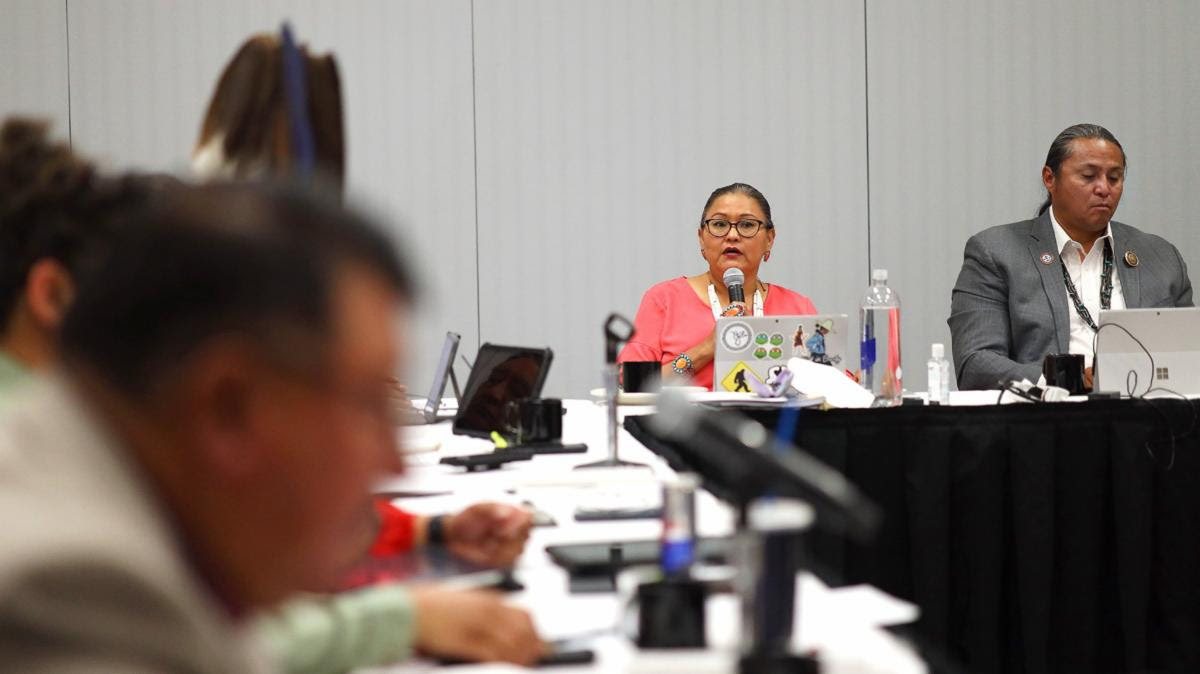
- Details
- By Native News Online Staff
During the quarterly meeting of the Coalition of Large Tribes (COLT), held June 2–3 at Eagle Crest Resort in Redmond, Oregon, Navajo Nation Council Delegate Eugenia Charles-Newton successfully passed legislation urging continued support for Othram’s forensic DNA services. The legislation encourages collaboration with the Bureau of Indian Affairs Office of Justice Services (BIA-OJS) through its Operation Spirit Return initiative.
“Time and time again, our justice system has failed Indigenous families. But with advancements in DNA technology, we now have tools that can finally bring answers—and closure—to those who have waited far too long. When our missing loved ones are identified, it shows that action is being taken,” Delegate Charles-Newton said. “We must continue supporting these efforts to bring our relatives home and help families begin to heal.”
Othram is a state-of-the-art forensic laboratory that integrates advanced DNA science and software to assist law enforcement in solving cold cases. The company has helped overcome long-standing forensic barriers, contributing to the identification of missing persons both nationally and internationally.
In May, during Police Week, Charles-Newton met with BIA-OJS officials and Othram CEO and founder David Mittelman, who highlighted the lab’s unique ability to extract DNA profiles from remains up to 200 years old—offering hope for cases long thought unsolvable.
At the COLT meeting, Oglala Sioux Tribe President Frank Star Comes Out asked whether Othram’s technology was currently being used in Missing and Murdered Indigenous People (MMIP) investigations. Charles-Newton confirmed that Othram is an active partner in Operation Spirit Return, a national initiative led by the BIA’s Missing and Murdered Unit. The program works to identify unknown human remains found on or near tribal lands—believed to be American Indian or Alaska Native—and return them to their families and communities.
“This initiative began under Secretary Deb Haaland’s leadership at the U.S. Department of the Interior and deserves continued support,” Charles-Newton emphasized. “Othram’s forensic capabilities have proven essential in solving cases that have remained cold for decades. This is a vital resource for Indian Country.”
Council Delegate Casey Allen Johnson, also present at the meeting, echoed his support for using advanced DNA technology in addressing the MMIP crisis. He stressed that innovative tools like Othram’s are key to achieving justice and holding perpetrators accountable.
The legislation passed unanimously with a 9–0 vote, directing COLT to issue a formal letter of support to BIA-OJS, urging the renewal of Othram’s contract.
More Stories Like This
Native News Weekly (August 25, 2024): D.C. BriefsNative News Weekly (February 22, 2026): D.C. Briefs
NCAI Releases Sttatement on the Passing of Rev. Jesse Jackson
Colusa Indian Energy Participates in Port of Quincy Town Hall on Columbia Basin Power Project
Q&A: Jingle Dress Dancer Answered Call to Ceremony in Face of ICE Violence
Help us defend tribal sovereignty.
At Native News Online, our mission is rooted in telling the stories that strengthen sovereignty and uplift Indigenous voices — not just at year’s end, but every single day.
Because of your generosity last year, we were able to keep our reporters on the ground in tribal communities, at national gatherings and in the halls of Congress — covering the issues that matter most to Indian Country: sovereignty, culture, education, health and economic opportunity.
That support sustained us through a tough year in 2025. Now, as we look to the year ahead, we need your help right now to ensure warrior journalism remains strong — reporting that defends tribal sovereignty, amplifies Native truth, and holds power accountable.
 The stakes couldn't be higher. Your support keeps Native voices heard, Native stories told and Native sovereignty defended.
The stakes couldn't be higher. Your support keeps Native voices heard, Native stories told and Native sovereignty defended.
Stand with Warrior Journalism today.
Levi Rickert (Potawatomi), Editor & Publisher


